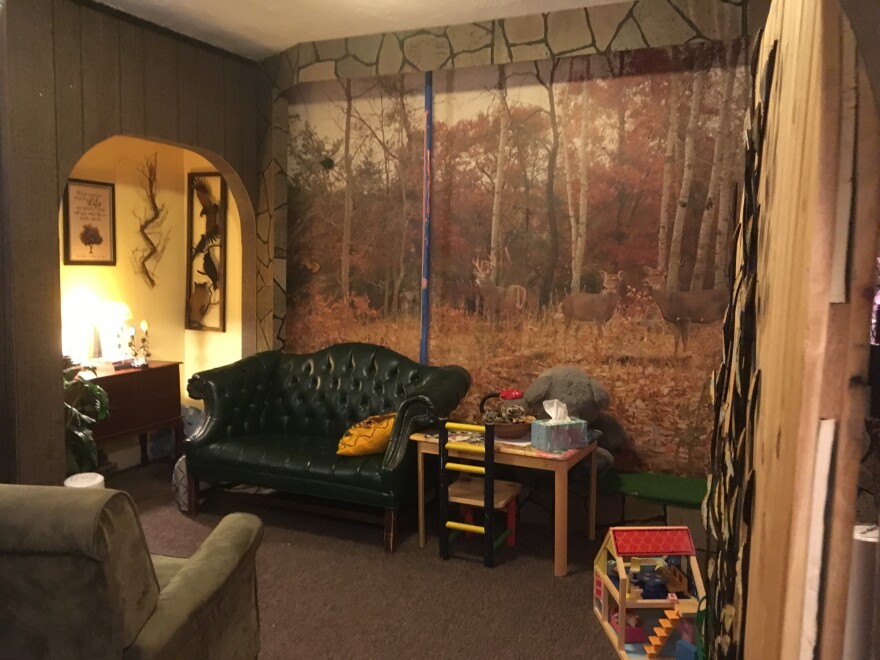A couple years ago, Manchester police lieutenant Nicole LeDoux and two colleagues decided to crunch some numbers. They found that in a single year, 400 Manchester kids had been at either domestic violence incidents or overdoses when police were called. LeDoux is a fast talker who oversees the juvenile and domestic violence units. “I remember sitting,” she said, “and being like ‘man, that’s a lot of kids. How do we deal with that?’”
On the one hand, said LeDoux, police are charged with enforcing laws, not providing social services. On the other hand, she saw firsthand that traumatized kids were being ignored. She saw them at overdose scenes, homicides, assaults, and more often than anything, at domestic violence incidents. Perpetrators might get arrested, victims would get assigned an advocate. Nobody, LeDoux said, was helping the kids.
“Can you imagine responding to a call, where you have a six year old who’s been the 911 caller because their parent has overdosed?” she says. “Police, Fire, EMS – you deal with the overdose, because that’s your job. But in your mind you’re thinking man, that’s a lot for that kid to handle.”
Research shows kids exposed to trauma are more likely to be violent, and victims of violence, later in life. Now, the Manchester Police Department is trying to do something to stop the cycle of violence.

Seeing The Cycle Of Violence
“Ten years into your career you go to a domestic violence call and it’s now an adult who was a kid at a (domestic violence) call you went to 10 years ago,” Ledoux said. “It’s well documented. If that’s what you grow up in and nobody steps in, and says that’s not the normal behavior between two people who are cohabitation and having a family, if nobody ever teaches you that, then you don’t know that.”
Adverse Childhood Experiences Response Team
Now, the Manchester Police Department has partnered with Manchester Community Health Center to test out a new kind of youth intervention program.
On a Wednesday evening, Police Sergeant Peter Marr led two social workers across the police department parking lot. One carried a colorful bag of toys. The trio piled into an unmarked police car and head to the city’s South End.
They were going back to the scene of a crisis where police were called earlier this week. This time, they weren’t going to enforce any laws. They were going to try to help kids get help.

The Goal Is...
Steven Durost’s mental health and arts therapy center is inside a castle. Outside, there are turrets and stone facing. Inside you’re greeted by music, and a seven foot replica of a knight in armor.
Durost specializes in childhood trauma. Up a spiral staircase, in a room full of toys and coloring books, he told me there is a way to overcome it.
“There’s really an amazing thing that happens,” he said. “When we really feel heard, and when we really feel witnessed, we feel more grounded, we feel more safe, and of course a lot of times domestic violence in a family is secret.”

Through a grant-funded collaboration with the Manchester Community Health Center, Manchester police are working to get kids to this place and others like it. Places where kids – ideally along with their parents -- can be seen and heard by professionals. It’s not easy. Parents in crisis can be too overwhelmed to call mental health centers for their kids. Not everyone wants to take parenting advice from police.

Twice every week, a police officer, a mental health advocate, and a victim advocate knock on doors where children have recently experienced trauma. They are one year into a three year pilot project.
It goes like this.
“Hey, how you doing, I’m Sergeant Peter Marr with the Manchester Police Department, we’re here because your child, according to our police reports, was witness to a traumatic event.”
Usually, that’s where the officer steps aside, and a mental health like Angela Delyani steps in.
“So then I would say that I’m the advocate from the Manchester community health center, and there are services that are available for the children to deal with the traumatic event that they witnessed.”

Most of all, Delyani is hoping to get the parent’s signature.
The police can send the family’s contact information over to a health center, and let the center follow up. It takes the burden off of the parent, and makes it more likely kids will get help.
The program is one of a kind., and according to the Manchester police department, it is receiving attention from across the country. Earlier this year, a couple dozen law enforcement and public health officials arrived in Manchester from the nation of Wales, to learn about the program.







